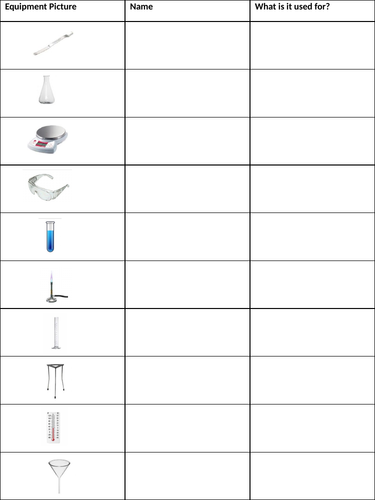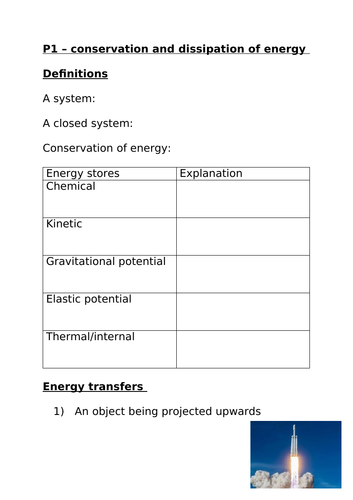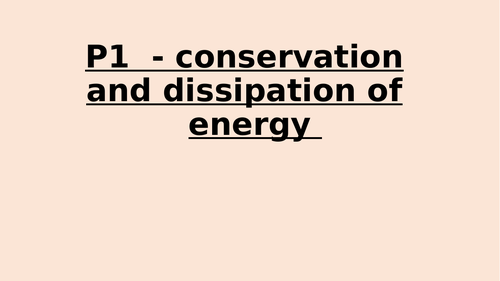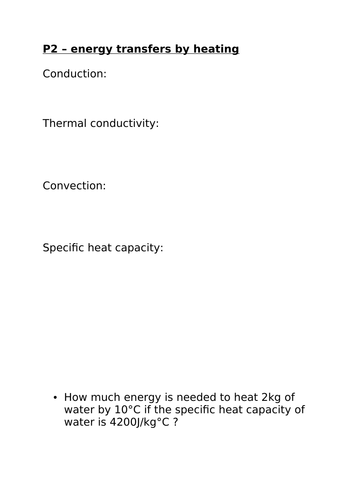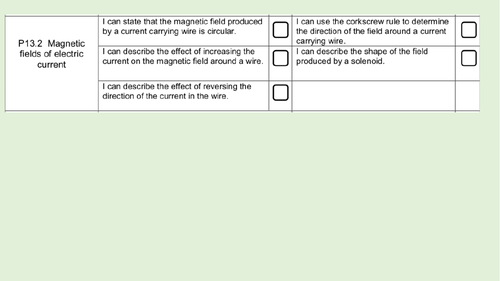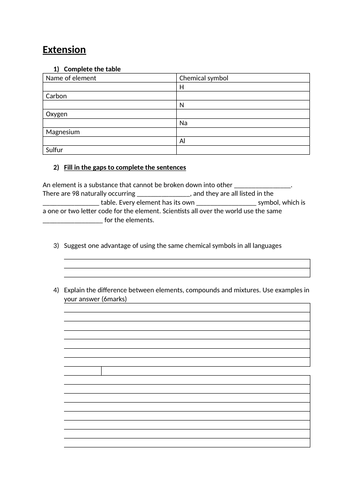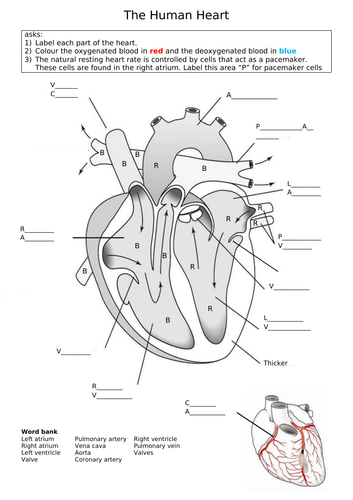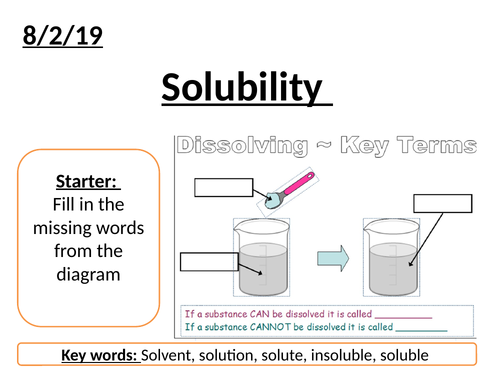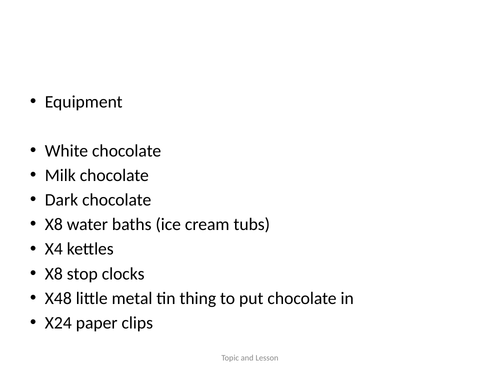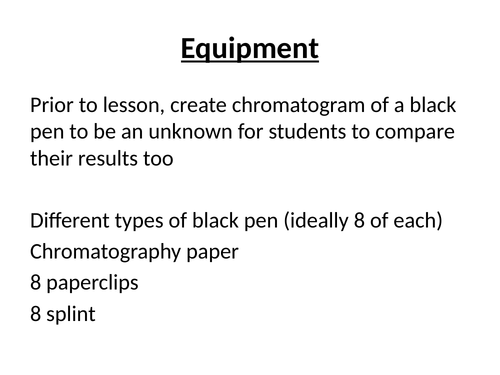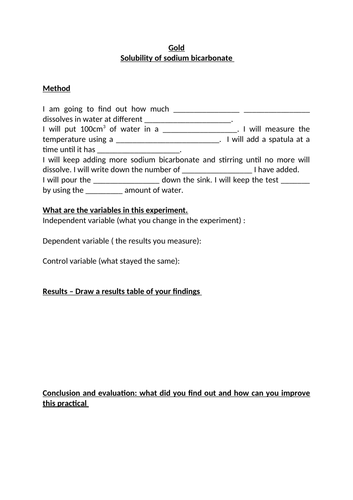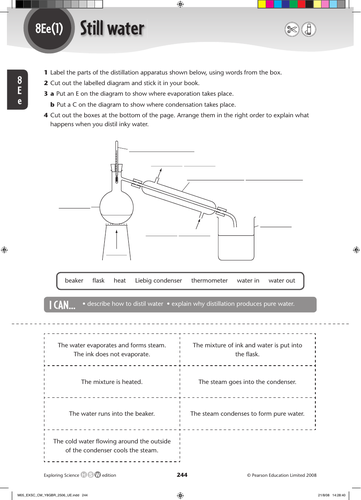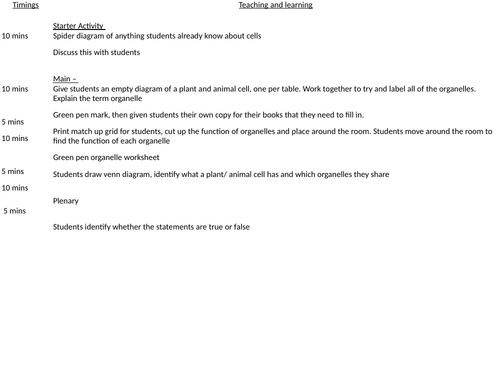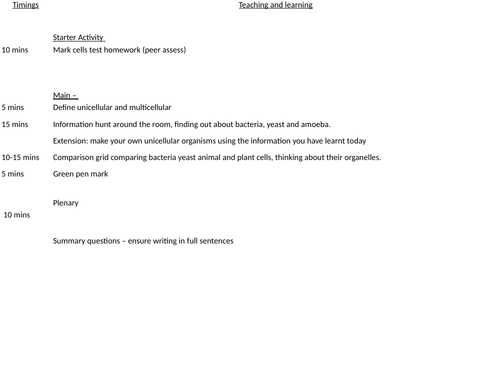
123Uploads
27k+Views
8k+Downloads
All resources

Lab equipment worksheet
A worksheet with common lab equipment for students to fill in as they are introduced to the lab.

Compounds
Suitable for KS3
Includes:
Introduction to compounds
Particle diagrams of elements and compounds
Naming compounds with two and three elements
Mini practical to compare elements and compounds
All answers included

P1 conservation and dissipation of energy summary
Summary powerpoint covering the P1 conservation and dissipation of energy topic from the AQA specification. (Kerboodle P1)
Contains a work booklet for students to use and make notes/do tasks/answer questions in whilst teacher runs through powerpoint.
Good for a summary/revision lesson.
All answers are on the powerpoint.

Physics paper 1 revision
Complete paper one Physics revision following the AQA trilogy specification.
Parts for higher only are highlighted.
work booklets to accompany powerpoint, which can be used in lessons or revision sessions.
Questions embedded in the powerpoint with answers for students to practice and focus on key concepts
My year 11s have found these benefical.

P2 energy transfer by heating
P2 - energy transfer by heating
Revision powerpoint for the topic, with a booklet for students to work through
P2 following the kerboodle specification

Chemistry paper one revision
Complete paper one Chemistry revision following the AQA trilogy specification.
Parts for higher only are highlighted.
work booklets to accompany powerpoint, which can be used in lessons or revision sessions.
Questions embedded in the powerpoint with answers for students to practice and focus on key concepts
My year 11s have found these benefical.

P3 - Energy resources summary
Summary of the P3 topic
Including a revision booklet for students to work through

P13.2 Magnetic fields of electric currents
P13.2 Following the AQA kerboodle scheme of work
Aimed at a low ability class with targets of level 4
Starter: differentiated bronze/silver/gold starter questions, with answers to green pen
Main: diagram of right hand rule to explain and label. Then a think pair share about different scenarios that could happen.
Sentence starters to help put their think pair share ideas together
Work on a solenoid - reduce task to reduce the information into one sentence
Plenary - differentiated pick the task

Elements and compounds KS3
Elements, compounds and mixtures- Some resources are from other areas on TES
Targeted at year 8 mixed ability class.
Starter: 5 minutes timed activity, challenege to see how many words students can make from the periodic table
Main: Go over definitons of elements/compounds/mixtures.
Then use these definitons to identify which particle pictures are elements/compounds
Go over rules of particle diagrams, then a choice of higher or lower ability sheet.
Higher ability sheet: students need to draw particle diagrams
lower ability sheet: students need to identify the correct particle picture
Extension: Worksheet, including tasks such as identifying elements, a fill in the gaps activity, 6 mark practicce question to explain the difference between elements/compounds/mictures
Plenary: Break the code using the periodic tab;e

B4.3 The heart
Biology Aqa trilogy, B4.3
Aimed at a mixed ability class
Starter: exam question based on previous lesson on blood vessels
Main: 2 minute video to introduce heart
double circulatory task
Then differentiated task on the heart to label
Plenary : exam question on labelling the heart

Filtering and evaporation KS3
Aimed at mixed ability year 8 - Some resources from TES
L1 - Starter: thinking about what sea water contains
Main: Think pair, share how to separate sea water
introduce key words
write a method/risk assessment for practical
Plenary: particle diagram of what happens during filtering
L2 - Main label equiptment in the diagrams and mark
Main: complete rock salt practical
Differntiated bronze/gold worksheets for students to work their way through
Plenary: one thing students learnt today
Marking sticker provided for the practical, if you wish to level the students work

Dissolving KS3
Aimed at mixed ability year 8 class
Starter: Add key terms to diagram, using key words for the lesson
Main: Define key words and explain solubility
Practical: see if different compounds are soluble or not
Then draw particle pictures of what happens when a substance is dissolving
Plenary: Tweet one thing students learnt today

Fractional distillation KS3
Aimed at a mixed ability year 8 class
Starter: work out the link between the pictures
Main: Explain what crude oil is and what fractional distillation is
Watch video, answer questions, green pen mark questions
Complete level 1/2/3 worksheets explaining fractional distillation
Extension: research task linking SMSC and crude oil
Plenary: What problems would we encounter if we banned all crude oil now

Melting points KS3
Aimed at mixed ability year 8 class
Starter: which chocolate do you think is the most pure?
Main: explain what is meant by pure
carry out a practical to melt different chocolates to work out which is most pure and how we know that
plenary: questions to evaluate the practical

Chromatography KS3
Aimed at a mixed ability year 8 class
Starter: summaries what separation techniques students have learnt about so far
Main: Define and explain chromatography
Show students a chromatogram and discuss what we can learn from it
Practical: carry out an investigation to see who wrote the note, work sheet to complete whilst chromatogram is developing
Extension: What effect does each mistake make
Plenary: Exam question

Solubility at different temperatures KS3
Aimed at mixed ability year 8 class
Starter: Write a hypothesis for what students think will happen to the amount of a solute that can dissolve as temperature increases
Main: Practical, have different water baths, see how much sodium bicarbonate dissolves at each temperature
Record results on worksheet
Differentiated worksheet higher or lower ability. Once completed practical evaluation and conclusion on each practical. Different tasks for higher and lower ability students

Simple Distillation KS3
Aimed at mixed ability year 8 class
Starter: would you drink dirty water, how do you think you could clean it?
Main: SMSC link to how many people dont have clean water, fill in SMSC grid based on video
Explain simple distillaation and equiptment, label diagram of equiptment
Watch distillation demo
Bronze/ Gold task to explain distillation
Extension task available on powerpoint
Plenary: Exam question
Bundle

Separation techniques KS3
Bundle of lessons for year 8
L1 - elements compounds mixtures
L2 - Dissolving
L3 - Solubility
L4 & 5 - filtering and evaporating
L6 - Melting points
L7 - Simple distillation
L8 - Fractional distillation
L9 - Chromatography

Plant and animal cells KS3
Aimed at a mixed ability year 7 class
10 mins
Spider diagram of anything students already know about cells
Discuss this with students
Give students an empty diagram of a plant and animal cell, one per table. Work together to try and label all of the organelles. Explain the term organelle
Green pen mark, then given students their own copy for their books that they need to fill in.
Print match up grid for students, cut up the function of organelles and place around the room. Students move around the room to find the function of each organelle
Green pen organelle worksheet
Students draw venn diagram, identify what a plant/ animal cell has and which organelles they share
Plenary
5 mins
Students identify whether the statements are true or false

Unicellular organisms KS3
Aimed at mixed ability year 7 class
Starter: how many cells make up the human body
Main: key definitions uni/multi cellular
task to move around the room and find out about different unicellular organisms
Comparison task to compare organelles in unicelllular organisms
Plenary: summary questions based on the lesson

